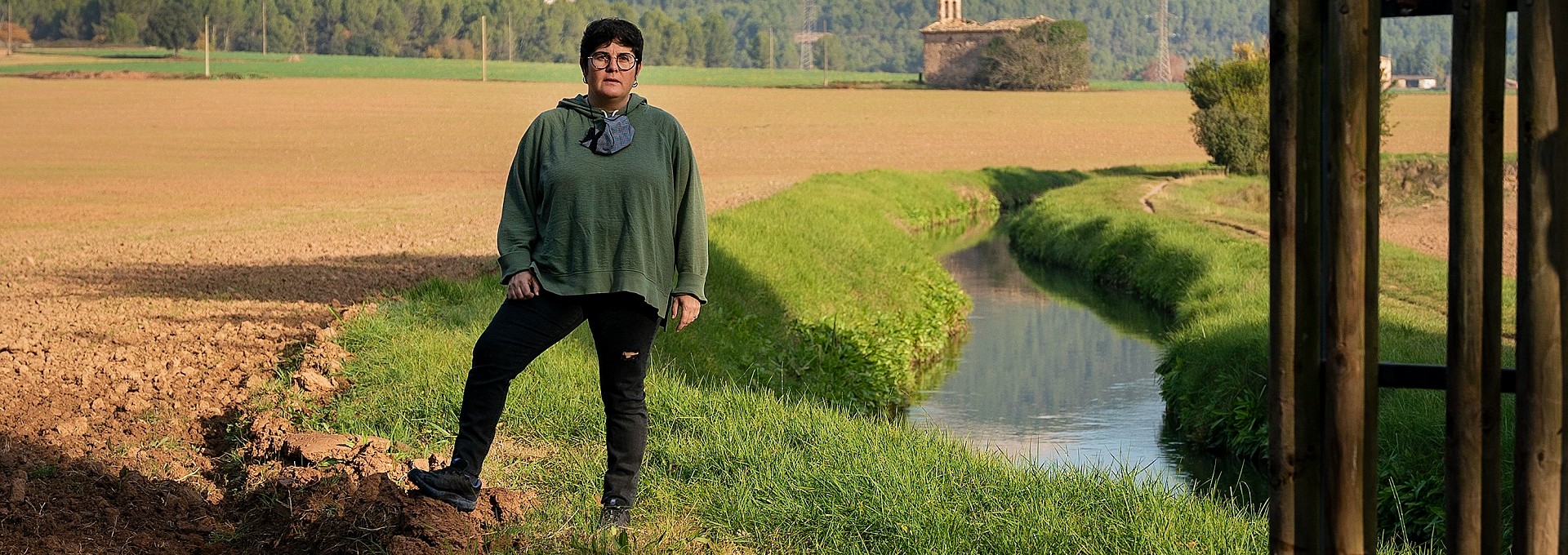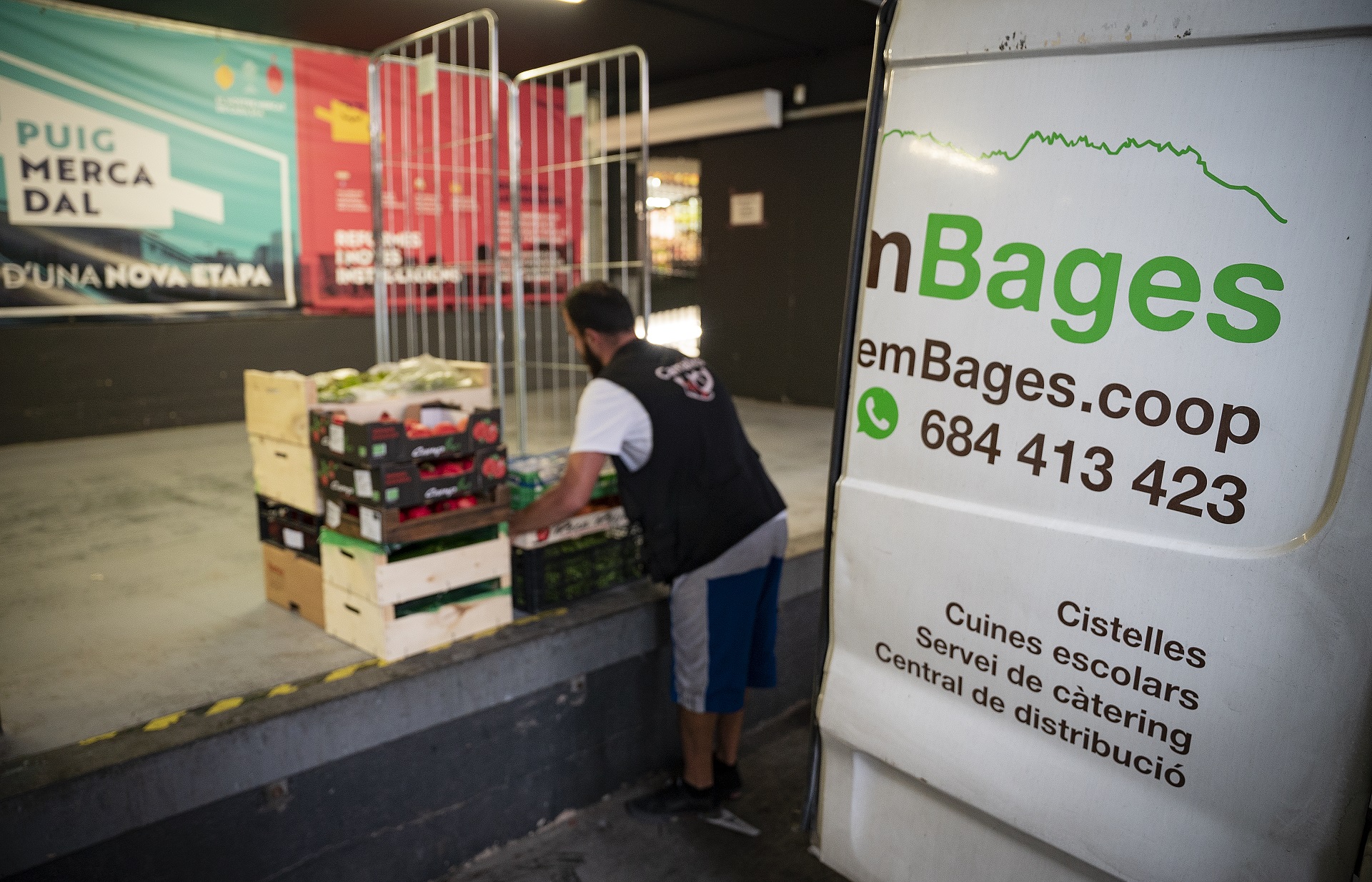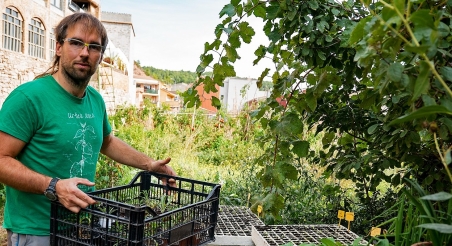Alba Rojas (Manresa, 1975) is currently the coordinator of the Central Catalonia Cooperative Athenaeum, which is known for its groundbreaking efforts in promoting social economy in the region. However, when Alba was a little girl thirty-five years ago, she witnessed a scene that left a deep impression on her.
Her paternal grandmother, a hardworking woman who supplemented the family budget by selling the vegetables she grew to some greengrocers in Manresa, returned home in an angry estate. This surprised Alba because Loreto was known for her calm demeanour, and rarely got upset, so Alba was curious to know what had happened. She listened intently as her grandmother explained how the buyers had drastically lowered the price of her vegetables. As a result, she decided to stop selling them in the city altogether. From that day on, Loreto only grew vegetables for herself and for her neighbours who appreciated the true value and quality of her produce.
The unwavering determination of her grandmother inspired a young girl to support numerous collaborative projects between small-scale local food producers and consumers. We interviewed her on the occasion of the premiere of 'Calm Strenght', the first of the 'BCN Smart Rural Stories'. This short film showcases the cooperative models that the new rural generation in the Barcelona province is pushing forward.
Why is it so important to cooperate? Which fibre of your body does this word touch?
I have a favourite sentence from Mafalda that perfectly sums up my opinion on this topic. Her words, «If it weren't for everyone, no one would be anything» resonates with me deeply. I believe that cooperation is essential to life. Without it, I don't think people could live together and be happy. Coexisting is not always easy, but cooperating indeed helps us grow as individuals. We may not always get along with everyone we meet, but the lessons we learn from working together are invaluable. "In my professional life, I have had both successful and unsuccessful relationships. However, I have learned a lot from the failures and have grown as a result. We work together in a collaborative environment, and I am interested in nurturing this relational space. I believe that shared projects can be more significant, efficient and considerate of people.
«Without cooperation, I don't think people could live together and be happy» Alba Rojas
What is a cooperative and what are its main values?
A cooperative is a business that follows the principles of social and solidarity economy. Its values are determined by the International Cooperative Alliance and are based, above all, on placing the individual at the centre. In addition, it is governed by principles of economic democracy, co-responsible management, equity, equality, transparency, emancipation and development of people. Cooperatives are concerned with supporting the individuals who are part of them so that they can grow with the project, and as a consequence, they take great care of information, training, etc.
Are there many different models of cooperatives?
Cooperatives arise to meet the needs of individuals who face deficiencies, and these deficiencies can be related to labour, consumption or services. From here, we find a whole range of cooperatives: from agricultural to educational to housing cooperatives, etc.
The cooperative culture in Catalonia, how healthy is it, and how has it evolved in recent years?
Cooperativism in Catalonia has a long tradition, and in fact, Catalonia was a pioneer worldwide in the creation of cooperatives: the first cooperative in the world was established in England, and very shortly after, the first cooperative in Catalonia was born. During the Republic, cooperatives were promoted, and the opposite happened during the Franco regime. There was a resurgence in the eighties, and currently, I believe that the cooperative movement is in good health, with strong representative entities and public policies making it present in the territory through the work of cooperative Athenaeums. This initiative by the Government of Catalonia aims to boost the economy and generate jobs in the region.
Specifically, do you know if there is currently a growing trend of consumer groups and cooperatives?
In general, right now, we are in a period of growth for cooperatives, mainly because we have more successful experiences, and there is more discussion about them. The cooperative model of consumption is taking root more strongly, and it is doing so in a different way than how it originated. The first consumer cooperatives emerged to meet the consumption needs of basic products in many towns or cities in industrial areas. Now, these cooperatives focus more on promoting changes in consumption habits, whether it's in terms of energy, food, mobility, etc.
More and more people are considering new ways of doing business. Could you explain what social economy is and how it relates to the agroecological movement in Catalonia?
The social economy is an economic model that prioritizes people's lives, practices responsible management, and engages with the natural and social environment where it operates. In this sense, it is closely related to the primary sector because what this sector does is precisely preserve the landscape. And when this preservation of the environment is done consciously and with sustainable and agroecological practices, its social impact increases. Therefore, all agricultural projects that aim to have a positive impact on the territory are part of social agriculture.
«The social economy is an economic model that prioritizes people's lives» Alba Rojas
Would you mind delving deeper into this topic? Do you think a cooperative impacts the territory differently than a traditional company?
Cooperatives are a business model that is unlikely to relocate. Remember that it is the people from the local community who come together to meet their needs, so it's a model that doesn't go elsewhere to generate economic activity. It's a deeply rooted and very local model that can grow and expand. What support organizations need to achieve is to consolidate this cooperative activity in the territory and ensure that the social and environmental benefits of this model positively transform the regions.
If we think at a global level, can cooperativism help us address the major challenges ahead?
I believe we are at a moment where we are considering important questions about our daily relationships with what we consume, where we contribute financially, and even how we relate to our workplace. It's an important moment, and we are also being told that we need to change if we want to achieve the UN Sustainable Development Goals and combat the potential collapse resulting from the climate emergency. What we might lack as citizens is the belief that this transformation is in our hands, that we can be agents of this change, and that there are possibilities and resources around us that facilitate all of this. Cooperativism is one of the elements that can help in these changes, especially because it puts people at the centre, directly impacts the local economy, and has a transformative perspective on the activity it engages in.
Do you think cooperatives are a good solution for small producers in the primary sector who face difficulties in moving forward with their farms?
Small livestock and agricultural farms have an opportunity in social economy models to build alliances, work in networks, and complement their activities. If done carefully, cooperatives and associations create opportunities for sharing transportation, facilities, and even business visions. Many agricultural projects are led by individuals who work alone and with such great effort and involvement that sometimes they don't have time to pause and rethink certain aspects. In contrast, projects that intercooperate and work in networks usually go a bit further and more easily.
«Small livestock and agricultural farms have an opportunity in social economy models to build alliances, work in networks, and complement their activities» Alba Rojas
Will consumer cooperatives become widespread in the future, or will they only serve a small part of the population? Do you think a new agro-social paradigm is emerging that prioritizes the consumption of local foods?
Consumer cooperatives are a model that allows us to transform our realities. It enables us to scale up the consumption of certain products and present powerful alternatives. Currently, in the region, there are both small projects and large-scale initiatives with a significant social mass, and the success of the model depends on the extent to which people are willing to get involved, be co-responsible, and understand that there is a significant part of consumer involvement needed to bring about transformation.
«Consumer cooperatives are a model that allows us to transform our realities» Alba Rojas
At the international level, are there any reference projects that we can draw inspiration from?
Internationally, Catalan cooperativism has different references. Quebec is a powerful one, but we also find interesting initiatives in Uruguay and some Asian countries. I don't think there's a key reference because the legislations are different, and therefore, in some countries, cooperativism may have a greater impact on the industrial sector, in others on the service sector, and in others on agriculture. In this sense, it is worth noting that the world also looks at us. Catalonia is also a reference in cooperative models and especially in public policies that incentivize this economic model.
«Catalonia is a global reference in cooperative models» Alba Rojas
In the years you have been working on the creation and development of cooperatives, what is the benefit that has surprised you the most?
Cooperativism as a transformative model has an aspect that clearly sets it apart from other models: governance management. This means that different people need to understand each other to develop an activity, and in this development, the emotional aspect plays a fundamental role. Perhaps that's why when a conventional company closes, people go to unemployment and move on. In contrast, when a cooperative project fails, there is much more commotion, and the failure has a much greater emotional impact. This has surprised me in all these years of accompanying projects: the fact that, sometimes, we are not very clear that this emotional and relational aspect also needs to be taken care of. Projects that take care of emotions have more chances to grow and consolidate. Then, of course, a cooperative is a business, and therefore, there needs to be a good organization, a good viability plan, etc. But this aspect of caring for the individual, their emotions and relationships is very important.
«Projects that take care of emotions have more chances to grow and consolidate» Alba Rojas
Do you think, in general, this model is sufficiently encouraged by public administrations, or is there more emphasis on traditional business models?
At the local level, there is indeed a clear political commitment, and in fact, many municipalities belong to the Network of Municipalities for the Social and Solidarity Economy. The Government of Catalonia also supports this economic model and, for the past six years, has been promoting the Cooperative Athenaeums Network. However, this model is not transversal: not all areas of public management are committed to it, and, in fact, there is still a lot of ignorance about these initiatives. I believe that the productive model and the social economy model are models that can coexist perfectly, and what we have to do is work to put them on an equal footing. At the moment, this is not the case.
The 'Rural Innova' action of the BCN Smart Rural strategy focuses on promoting social agriculture in the province of Barcelona and is based on giving advice and support for social and solidarity economy initiatives in the area of agri-food. How do you value this specific action?
BCN Smart Rural has had a very welcoming approach to the different entities that carry out activities in the territory. This welcoming vision has allowed us to work together with a lot of trust and co-responsibility, which has benefited the projects we have jointly supported, each from its role and capacity. More specifically, what BCN Smart Rural has brought to the Central Catalonia Cooperative Athenaeum is the possibility of working with different agents to help projects that were born with a focus on social entrepreneurship from different areas. The fact that we can come together, share the same concept, and inter-cooperate with what each entity can offer has allowed us to provide more comprehensive support than each of us could have done alone. The Athenaeum does not have the resources that the Diputació de Barcelona or the Association of Rural Initiatives of Catalonia (ARCA) can offer, and yet, by working together, we have been able to support different projects much more effectively. BCN Smart Rural has also helped us have a comprehensive view of the needs of people working in the field and new opportunities in social economy and cooperativism. I'm referring to land banks, agrarian test spaces, shared food processing facilities and abattoirs, etc. I think it is a very powerful and integral project that develops with a vision of inter-cooperation, and for this reason, we value it very positively.
What is the main challenge facing cooperatives that want to grow and develop optimally?
The biggest difficulty currently facing the social economy and cooperative projects is often funding. Accessing private funding is difficult because banking entities don't fully understand cooperative projects. We need to do more education about the philosophy guiding these initiatives, their organizational system, and the diversity they generate to secure the necessary capital. To achieve a leap of scale, a significant challenge is inter-cooperation, meaning our ability to forge alliances among ourselves to grow the model.
— BCN Smart Rural Editorial —




